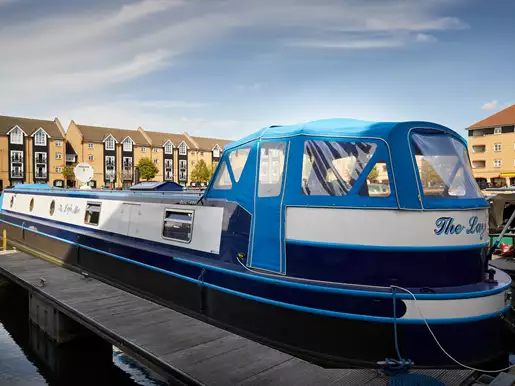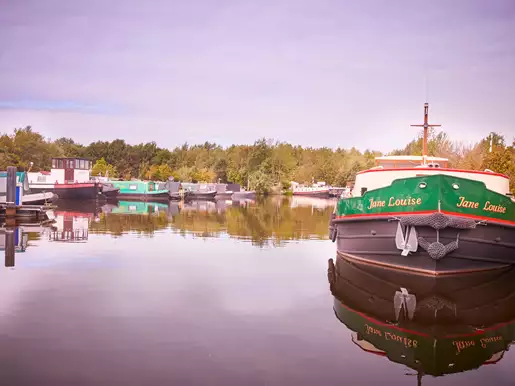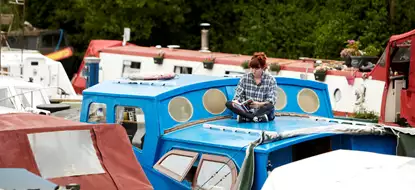How to Buy a Boat
Buying a boat can seem daunting if you’ve never done it before - you want to be sure you’ve made the right choice with a boat that meets all of your requirements!
The boat market is particularly tricky as it differs from getting on the property ladder. Not only are there additional legal aspects to boat-buying, but oftentimes there are no publicly available values for used boats.
At Aquavista, we want to equip you with all the relevant info on how to buy a boat. Read our guide on the best way to buy a boat, to help you seal the deal with confidence!
How to Buy a Boat: Step by Step
If you’ve read our guide to residential living at a marina, you may be sold on the idea of making a boat your permanent or semi-permanent home! However, you should make sure to go through the stages of buying a boat properly, starting with quality research.
In general, there are four stages to the boat-buying process: research, viewing, making an offer and buying.
Step 1: Boat Research
Researching before making any large purchase is important, and it’s no different when it comes to buying a boat. Before you research, have a think about what kind of boat you want.
Which criteria are most important to you? Are you buying a boat for living or leisure? What is your budget? How long are you thinking of residing on your new boat? Once you have a list, you can start to research and view boats that fit your needs!
Do you need a license to drive a boat?
In the UK boat owners need few boating licenses, qualifications and other legal requirements in order to operate. You don’t need to hold a boating qualification in order to buy a boat (whether that’s to live on or for leisure cruising).
However, there are few exceptions.
Vessels over 13.7m long
Vessels over 13.7m, even if only used as private pleasure boats, are defined as Class Vll vessels in the Merchant Shipping Regulations. This means they are required to have a minimum level of fire fighting and life saving equipment.
Canal and River Trust/ Environment Agency Licences
If you use a boat on a canal or river, you will need a licence from the Canal and River Trust or the Environment Agency, depending on the waterways you want to navigate. These are available for periods of one, three, six or twelve months.
To be eligible, the boat must have a Boat Safety Certificate and insurance to cover a minimum of £1,000,000 of third party liability.
Where can I cruise?
If you’re planning on cruising, check the lock dimensions and height limits (air draft) of the routes you think you’ll take – and buy your boat to fit these needs. Boats wider than 6ft 10inch can only navigate waterways with double width locks, whilst some larger cruisers and Dutch Barges may be too big to fit under canals with arch bridges.
Recommended equipment and training
The RYA Inland Waterways Helmsman Course is perfect for anyone who wants to build up their skills before they buy.
Carrying life jackets, a compass, anchor(s), means of communication and distress alerting on board is also recommended by the RYA.
How much does a boat cost to buy?
If you are buying your first boat or plan to downsize, opting for something cheap may feel like an attractive option. However, just like with cars, renovations and fixer uppers may end up costing you more than a newer model – and take longer than expected.
It’s a good idea to view boats on a flexible budget. Different boats may have essential and built-in features that are included in the price which you hadn’t previously thought of. So while a boat may seem expensive to buy, it could turn out to be the cheaper option in the long run.
Can I get a mortgage on a boat?
Most mainstream banks won’t give you a mortgage on a boat, even if you intend to make it your permanent home on a residential mooring. This is because you don’t own the land on which the boat is moored.
However, there are financing options available to budding boat owners, mainly through specialist ‘marine mortgage’ lenders. You can contact them for specialist advice and to get the best deals on the mortgage market for when you decide to purchase your boat.
Can I get a mooring?
Moorings can be very difficult to find. In some area’s of the country, especially London, there is a real shortage of available moorings. With the recent interest in people moving onto the water, many marina’s have a waiting list for wide-beam boats. It’s always worth checking mooring availability before buying.
How do I choose the right boat for me?
Will you live onboard or use for extended cruising? If so, narrowboats and widebeams are often more suitable – and equipped for residential living.
Or will you use your boat for day trips and short breaks? Cruisers are more suited for short breaks away or just a base to relax in. They are often less expensive for a mooring, river license and insurance. But as they don’t have insulation, they are only really suited to use in warmer months.
Think about how you will use the space aboard - traditional sterns offer more internal space and room for storage. A cruiser stern gives you more outside space that allows you to be much more sociable and have friends around you when cruising.
Step 2: Boat Viewing
Should I view boats at a brokerage or look online?
Looking online will give you a feel for the market, but there’s no substitute for stepping on board. When you buy privately, you’ll often find the boats you’re interested in are located at opposite ends of the country, which makes seeing them logistically difficult.
The best way to view lots of boats in a single day is to visit a brokerage. Our main sales basins are located at Sawley, Nottinghamshire, Crick, Northampton and Limehouse, London, here you can view a large selection of boats in one place with no obligation or pressure to buy.
If you’re a novice, our experienced, nationwide brokers will listen to your needs and guide you towards boats that are suitable for you. With intimate knowledge of the market, you’ll know the boats you’re viewing are sensibly priced, plus you’ll get an honest appraisal of the condition of the boat and learn why the seller has decided to part with it.
How do I view a boat?
If you see a boat you like, make an appointment by following these steps...
- If you see a boat you like, make an appointment to view the boat at a time that suits you – contact us via email or telephone. Our team will be happy to show you around and find out more about your needs.
- After your first viewing, if you want to view again, just get in touch.
Step 3: Making an Offer on a Boat
Are boat show prices negotiable?
Nicely-kept, sensibly-priced boats tend to sell for close to their asking price. But if a boat’s been on the market for a long time, the owner may be prepared to negotiate (especially if it’s unused and costing them money on mooring and insurance).
Using a brokerage service can help you negotiate, letting you know what’s a realistic price to offer and help you secure your dream boat at a fair price.
What legalities do I need to know before putting in an offer?
There are a few key points to solidify before putting in an offer:
- Proof that the boat is legally the owner’s to sell, with no outstanding fees or loans tied to it.
- An inventory of the machinery and equipment on board that is included in the sale. The inventory forms part of the contract and should be initialled and agreed by both parties after joint inspection.
- Copies of previous surveys that have been carried out (you will still have to have the boat surveyed when it’s officially yours). Boat survey costs are generally around £15 per foot.
- Make sure your offer is subject to survey and has insurance in place so your boat is covered as soon as you buy it.
Unlike buying a house, once you make an offer on a boat, things can move very quickly. After you’ve agreed on a price, the sale progresses to the contract stage fast, which is binding once signed and usually requires a deposit of 10% of the agreed selling price of the boat.
With this in mind, you need to be sure before you put an offer in. Check the terms and conditions of your deposit payment, as some companies may not refund your deposit if you wish to pull out of the purchase.
How do I make an offer on a boat?
- If the boat is right for you, submit an offer.
- Our experience crew will liaise with yourself and the seller to help agree on a price and make the whole process as easy as possible for you. Once the price is agreed pay the 10% deposit into the Aquavista brokerage account.
- Once an offer has been agreed we would advise you to have a pre-purchase survey. You usually have to diarise this, and securing a time can sometimes take a couple of weeks. Don’t worry though, we can help and provide you with a list of useful contacts that are able to help. At this point we ask for a holding deposit to secure the boat whilst the survey, arrangements for finance (if required), trial runs etc, are carried out.
Step 4: The buying process
What happens when my offer is accepted?
After your offer is accepted, you’ll sign a contract, pay a deposit and then have a survey. Contracts normally give a two-week period for a survey to be carried out and are binding unless any problems are detected that haven’t already been declared.
When a boat is sold at a brokerage, you get additional peace of mind. The deposit goes into a brokerage client account which protects it. If the vendor goes bankrupt during the process, your money is safe.
What kind of boat insurance do I need?
Your level of boat insurance depends on how you plan to use your boat. For example, if you’re going to be cruising any of the UK inland waterways on a powered or houseboat, you’ll usually need ‘third party’ insurance for at least £1 million.
You may also need insurance for some types of unpowered boat, e.g. a houseboat. For this, you should check with the navigation authority that manages the waterway you want to use. You can register your boat on any waterways on the gov.uk website.
Boat insurance costs
Boat insurance costs will vary according to where the boat is moored, how you plan to use it and what level of cover you require. If you’re buying a boat to live on, it’s key to make sure that your insurance covers not only damage but also theft. Most providers offer optional extras so you can tailor your cover to suit you. At Aquavista, we offer all our berth holders 20% off insurance with Towergate.
What kind of mooring do I need?
If you plan to use your boat for pleasure, you could moor your boat in a leisure berth. But to make it your home, you’ll need to find a residential mooring, unless you plan to continuously cruise.
How do I buy a boat?
Once your survey is returned, if you’re happy with the findings on the survey and the agreed price we will contact the seller and arrange for you to make your final payment for the boat. If you now feel that the boat is no longer right for you, you can cancel the purchase at this point with no penalty – other than the price you have paid for you survey. At this point, if you haven’t already secured a mooring, this is the best time to enquire.
To progress with purchase, final payment is made into our client account and the boat cannot be released until cleared funds are seen. Once received we make sure the final paperwork is signed. Then the boat is yours!
Where do I find my boat?
Visit www.aquavista.com/buyaboat and filter by location and boat type.
Tip: If you have decided to buy a widebeam boat, we recommend securing a mooring as soon as possible as they can sometimes be trickier to secure.
But what about a mooring? Where do I keep the boat?
We can help with that as well. With 29 Waterside & Marina locations we are certain to have a location that suits your requirements.
Boats sold in our London Marinas are sold with a transferable license to moor, subject to a successful application. In these marinas additional charges will apply to transfer the berth into your name if you choose to buy your boat through Aquavista or a third-party broker.
Choosing Aquavista means we can guide you through the process of finding a residential mooring. Many of our beautiful marinas UK wide offer well-maintained residential berths. These are UK wide with lots of facilities that make life on board more comfortable.
Find out more about mooring with Aquavista.








